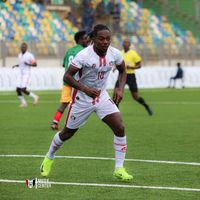As the international break unfolds, a spotlight shines on Africa's national football teams, particularly the Sudanese squad, which is navigating the turmoil of a devastating civil war while aiming for a historic World Cup appearance. Despite the grave challenges, the Falcons of Jediane, under the direction of coach Kwesi Appiah, have surged to the forefront of Group B in the 2026 FIFA World Cup qualifiers.
The context is stark; over two years of civil strife in Sudan have led to the loss of over 150,000 lives and the displacement of more than 12 million people. Yet, in an inspiring turn of events, the national team has been revitalized, having previously captured the African championship title in 1970. Sudan’s recent qualification for the Africa Cup of Nations marked their first appearance since 2012—an achievement notable for eliminating the Ghanaians from the competition.
Heading into this international break, Sudan was perched atop their qualifying group, resting one point ahead of the Democratic Republic of Congo. However, their recent encounter against Senegal was a tough test, ending in a goalless stalemate on neutral ground in Libya. Faced with the pressure of performance, Sudan's failure to score—a result of missing key attacker and team leader Mohamed Abdelrahman who is sidelined due to a knee injury—was evidently felt. Appiah admitted, "Our chances were limited without Abdelrahman, who is critical to our attack," underlining the significance of the harm done to their ambitions.
In the match against Senegal, known for their star-studded lineup and notably the famed Sadio Mané, Sudan’s defense shone bright. They displayed meticulous organization and determination, frustrating their opponents’ efforts to convert possession into clear scoring opportunities. While Senegal remains undefeated in the qualifiers, they find themselves two points adrift of Sudan, a nagging deviation away from the ideal they seek.
Looking ahead, Sudan now confronts a derby clash against South Sudan, which is trailing far behind in the standings. With only two points from five matches, the Bright Stars of South Sudan are desperate for an upswing but will face a charged Sudanese side eager to secure their spot in football history.
Meanwhile, the narrative shifts to the broader landscape of African football during this international window. Multiple fixtures have highlighted both triumphs and struggles. In another pivotal matchup, Algeria showcased their dominance over Botswana with a 3-1 victory, featuring Riyad Mahrez, who celebrated his remarkable 100th cap for the national team. Mahrez's contributions, both as a player and as a leader, were praised post-match by his former coach Vahid Halilhodzic, who noted, "He's had an exceptional career and he's become the captain of the national team, showing many qualities. His technical skills are extraordinary, enabling him to create and score crucial goals."
Algeria, tied for points with Mozambique at the top of Group G, look poised to continue their impressive form, particularly when they host Mozambique in a clash that could decide the lead in their group. On a contrasting note, Nigeria's Super Eagles found success in their recent outing by securing a much-needed victory against Rwanda, alleviating some immediate pressure on incoming coach Eric Chelle, as Victor Osimhen scored twice to uplift his team to six points in the qualifiers.
In Cameroon's camp, however, the situation appears less rosy. Their 0-0 draw against Eswatini, witnessed by a limited crowd of only 700, stirred unrest among fans regarding the game’s outcome and the logistics leading up to the match. The team's travel disruptions were particularly damaging, arriving merely hours before kick-off and lacking the preparation expected of a nation renowned for its past footballing successes. As they prepare to host Libya in another critical tie, coach Marc Brys must galvanize his players to maintain their historic reputation against mounting discontent.
In another highlight from the qualifying window, Gabon is riding high on success, capturing victories against Seychelles and Kenya, which has positioned them well in their group, fueled by Pierre-Emerick Aubameyang's strong performances. Meanwhile, Ivory Coast’s narrow victory over Burundi keeps them in contention, emphasizing the competitiveness of this qualifier, where each match serves as a stepping stone towards the prestigious World Cup event.
The upcoming fixture where Sudan faces South Sudan could pave the way for a dream World Cup opportunity—a significant point for a nation grappling with adversity and seeking unity through sport. With just five matches played in this group stage, where the top team secures direct qualification, the Falcons hold an impressive 11 points from three wins and two draws. Their determination, combined with a solid defensive strategy that has leaked just one goal, outlines a team ready to defy the odds.
As the clock ticks towards their next match at Martyrs of Benina Stadium, enthusiasm rises amidst the uncertainty that surrounds presidential elections, civil strife, and the quest for footballing glory. With the whole nation watching, the Falcons will look to immortalize their legacy in the world of football and rewrite the narrative of their tumultuous history. Victory against South Sudan would not merely confirm their qualification aspirations but also ignite a sense of pride for a beleaguered nation yearning for triumph. With everything on the line, the Sudanese team finds itself standing at the threshold of history.






